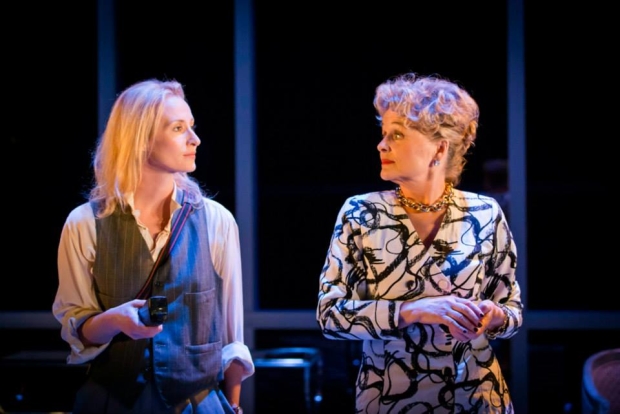Splendour (Donmar Warehouse)
Sinéad Cusack stars in Robert Hastie’s revival of Abi Morgan’s ‘intriguing’ play

© Johan Persson
It’s probably a good idea to have a fresh look at Abi Morgan‘s play first seen at the Traverse during the Edinburgh Fringe of 2000, especially as Sinéad Cusack is playing the dictator’s oddly named wife Micheleine, a swanky, elegantly dressed – and doomed – amalgam of, say, Imelda Marcos, Mirjana Milosevic and Eva Peron.
The play itself is slightly infuriating and, as I said first time round, only sustained with the slightest veneer of tension. Vicky Featherstone‘s original production was set in a sunken swimming pool where something horrible had patently happened. Here, Peter McKintosh‘s design is of an anodyne palatial bolthole with huge glass windows, red carpet and crushed ice on the floor.
Four women are sipping chilli vodka and waiting for the revolution to kick in. They talk in fits and starts, repeat themselves, start again. Only Micheleine is even half way relaxed. The others are wound up, frisky like ferrets in a sack. Micheleine’s best friend of thirty-five years, Genevieve (Michele Fairley), "the woman in a green dress," has lost her family. She’s miserable and traumatised, not much fun to play, I imagine, and not much fun to watch.
A photographer, Kathryn (Genevieve O’Reilly), is waiting to "shoot" the dictator who, like Godot, never comes. She is accompanied by an interpreter, Gilma (Zawe Ashton), from "up north," who’s jumpiest of all and surreptitiously nicking luxury goods. In the middle of the play, Gilma fondles a pink Venetian glass vase and it shatters on the ground.
Like the vase, Morgan’s play is an accumulation of shards and splinters. Indeed, at its premiere, its fragmentary structure was likened to that of a Caryl Churchill play, Blue Heart. We never see the full picture, or indeed the full painting that hangs invisibly at the front of the stage, a parting gesture of defiance by Genevieve’s artist husband.
One thing is clear in Robert Hastie‘s production, brilliantly lit by Lee Curran, with flashbulb effects between scenes: Micheleine knows the game is up, serenely recounting how she listens to her own Prada heels clacking along the corridor. Cusack implies a past life of irresponsible ease and luxury while her companions are blown along the winds of change and devastation.
And whereas, before, the play was clearly a post-script to the conflict and atrocities in former Yugoslavia, the neutrality of the political context both suits the self-conscious experimentalism of the form and undermines the impact of the play as a testament to women in the war zone. Still, the dense 95 minutes are never less than intriguing, and Cusack at least offers a disturbingly glamorous perspective on a dictatorship in decline and disarray.
Splendour runs at the Donmar Warehouse until 26 September. Click here for more information and to book tickets.













